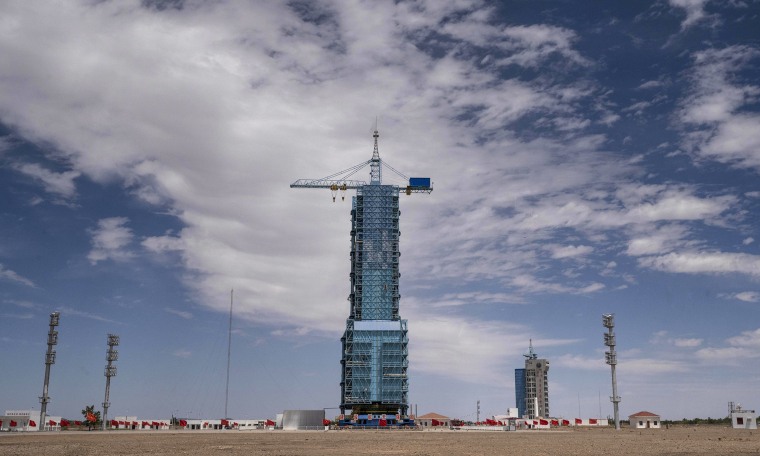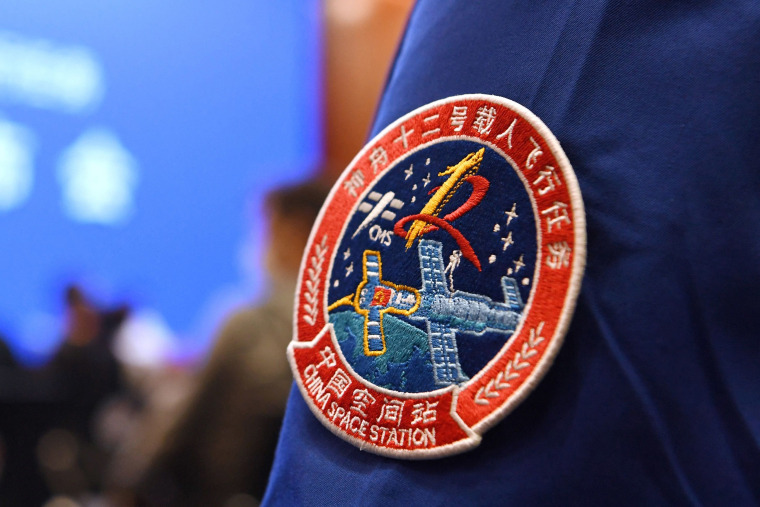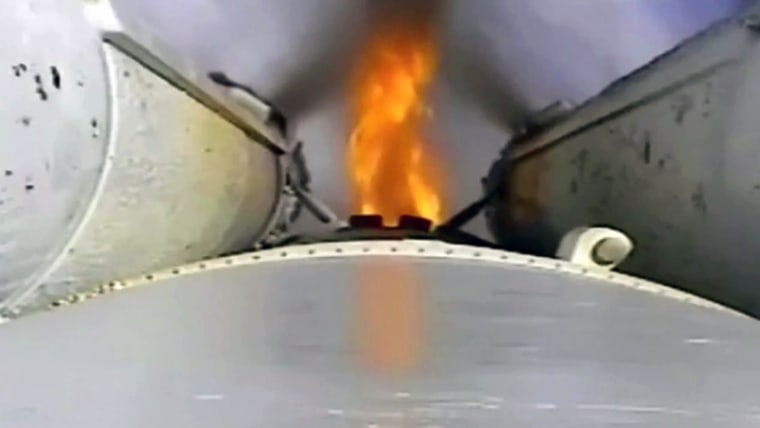'Divine Vessel' rocket launches China's first human spaceflight since 2016
“We have invested so much energy,” said Rong Yi, the rocket’s chief designer. “But I am thrilled to see it fulfill its duty within 10 minutes.”
By Janis Mackey Frayer
JIUQUAN, China — A Chinese rocket blasted off from a launch pad in the Gobi Desert on Thursday, sending three astronauts on a historic mission to an orbiting space station China is building.
Fire and huge clouds of dust could be seen in the distance when the Long March-2F rocket carrying the Shenzhou-12 capsule roared away from the Jiuquan Satellite Launch Center, as China’s space race with the United States and Russia continues to gather pace.
It was the first time in five years that China has sent humans into space.
For Rong Yi, the rocket’s chief designer, it was hard to see it go.
“We have invested so much energy,” she told NBC News, likening the rocket to raising a child. “But I am thrilled to see it fulfill its duty within 10 minutes.”

The launch platform housing the Shenzhou-12 spacecraft and Long March-2F rocket at China's Jiuquan Satellite Launch Center on Wednesday, Kevin Frayer / Getty Images
Shenzhou-12, or “Divine Vessel," is one of 11 planned missions to complete construction of China’s 70-ton Tiangong or Harmony of the Heavens space station that is set to be up and running by next year.
The astronauts will remain docked with the main Tianhe section of the station for three months — China’s longest crewed mission yet — to perform spacewalks, maintenance work and critical testing of life support and other systems.
“I believe that in the near future, when the Chinese space station is complete, we will see Chinese and foreign astronauts taking on joint missions,” China Manned Space Agency Assistant Director Ji Qiming said at a news conference Wednesday ahead of the launch.
“Exploring the vast universe, developing space activities and building a powerful space nation is our unremitting space dream,” he said.
China has long been frozen out of the International Space Station, or ISS, a project launched 20 years ago that has served as the ultimate expression of post-Cold War reconciliation between Russia and the United States. American concerns over the Chinese space program’s secrecy and connections to its military were largely responsible for that.
But the aging ISS that hosted astronauts from the U.S., Russia and a number of other countries is set to be decommissioned after 2024. As broader U.S.-Russia relations deteriorate, Moscow has hinted that it may withdraw from ISS cooperation in 2025, meaning China could be the only country with a functioning space station.

Shenzhou-12, or “Divine Vessel," is one of 11 planned missions to complete construction of China’s 70-ton Tiangong or Harmony of the Heavens space station that is set to be up and running by next year.
The astronauts will remain docked with the main Tianhe section of the station for three months — China’s longest crewed mission yet — to perform spacewalks, maintenance work and critical testing of life support and other systems.
“I believe that in the near future, when the Chinese space station is complete, we will see Chinese and foreign astronauts taking on joint missions,” China Manned Space Agency Assistant Director Ji Qiming said at a news conference Wednesday ahead of the launch.
“Exploring the vast universe, developing space activities and building a powerful space nation is our unremitting space dream,” he said.
China has long been frozen out of the International Space Station, or ISS, a project launched 20 years ago that has served as the ultimate expression of post-Cold War reconciliation between Russia and the United States. American concerns over the Chinese space program’s secrecy and connections to its military were largely responsible for that.
But the aging ISS that hosted astronauts from the U.S., Russia and a number of other countries is set to be decommissioned after 2024. As broader U.S.-Russia relations deteriorate, Moscow has hinted that it may withdraw from ISS cooperation in 2025, meaning China could be the only country with a functioning space station.

A staff member wears the logo of China's new space station at a news conference about the first crewed mission to China's Tianhe space station.Greg Baker / AFP - Getty Images
Roscosmos, the Russian space agency, also signed an agreement in March with the Chinese National Space Administration to build a base on or around the Moon, which they will call the International Scientific Lunar Station.
“All the firsts that the U.S. and the USSR did in the Cold War, China is just ticking them off,” said Jonathan McDowell, an astrophysicist at the Harvard-Smithsonian Center for Astrophysics. “Now they’re at the point where they’re starting to think, ‘OK, we’re not just copying the West anymore, we’re going to start doing our own thing’. And that’s going to be very interesting to watch.”
Ahead of the launch, the Chinese astronauts met Wednesday with reporters from inside a glass chamber to ensure they remained germ-free.
Veteran Nie Haisheng, 56, was looking forward to his third trip to space, while Liu Boming, 54, took part in a 2011 mission that included China’s first spacewalk.
They were joined by 40-year-old Tang Hongbo, who was looking forward to his first journey up to the stars, having been selected for training in 2010.
“There is pressure,” he said. “But where there is pressure there is motivation.” He added that he had “confidence in myself and confidence in our team.”
Download the NBC News app for breaking news and politics
After Tianhe's main module was successfully launched last month, state media reported that President Xi Jinping wrote a letter to congratulate Chinese engineers for a breakthrough that earned a place in the nation’s history.
However, China’s government was forced to defend itself after NASA and others accused Beijing of acting recklessly by allowing a rocket booster from that mission to fall to Earth in a seemingly uncontrolled manner.
Wednesday’s launch was covered on state television and celebrated as a matter of prestige ahead of the Communist Party’s 100th anniversary next month.
For Xi, the space station holds symbolic value in his vision of his country as “a space power in all respects.”

Chinese rocket debris crashes into Indian OceanMAY 9, 202100:31
But as China pours billions of dollars into its space programs, including an exploration of the dark side of the moon and its recent landing of a rover on Mars, some analysts fear that its lack of international coordination is creating a dangerously competitive playing field in space.
“Beijing is working to match or exceed U.S. capabilities in space to gain the military, economic and prestige benefits that Washington has accrued from space leadership,” according to the annual threat assessment published by the Office of the Director of National Intelligence.
Zhou Jianping, the chief designer at China’s Manned Space Agency, sees it differently.
“There is no doubt the U.S. is the most advanced,” he told NBC News near the launch site, “Regardless of scale, China develops space programs out of our country’s own need … to fulfil our own dream.”
Roscosmos, the Russian space agency, also signed an agreement in March with the Chinese National Space Administration to build a base on or around the Moon, which they will call the International Scientific Lunar Station.
“All the firsts that the U.S. and the USSR did in the Cold War, China is just ticking them off,” said Jonathan McDowell, an astrophysicist at the Harvard-Smithsonian Center for Astrophysics. “Now they’re at the point where they’re starting to think, ‘OK, we’re not just copying the West anymore, we’re going to start doing our own thing’. And that’s going to be very interesting to watch.”
Ahead of the launch, the Chinese astronauts met Wednesday with reporters from inside a glass chamber to ensure they remained germ-free.
Veteran Nie Haisheng, 56, was looking forward to his third trip to space, while Liu Boming, 54, took part in a 2011 mission that included China’s first spacewalk.
They were joined by 40-year-old Tang Hongbo, who was looking forward to his first journey up to the stars, having been selected for training in 2010.
“There is pressure,” he said. “But where there is pressure there is motivation.” He added that he had “confidence in myself and confidence in our team.”
Download the NBC News app for breaking news and politics
After Tianhe's main module was successfully launched last month, state media reported that President Xi Jinping wrote a letter to congratulate Chinese engineers for a breakthrough that earned a place in the nation’s history.
However, China’s government was forced to defend itself after NASA and others accused Beijing of acting recklessly by allowing a rocket booster from that mission to fall to Earth in a seemingly uncontrolled manner.
Wednesday’s launch was covered on state television and celebrated as a matter of prestige ahead of the Communist Party’s 100th anniversary next month.
For Xi, the space station holds symbolic value in his vision of his country as “a space power in all respects.”

Chinese rocket debris crashes into Indian OceanMAY 9, 202100:31
But as China pours billions of dollars into its space programs, including an exploration of the dark side of the moon and its recent landing of a rover on Mars, some analysts fear that its lack of international coordination is creating a dangerously competitive playing field in space.
“Beijing is working to match or exceed U.S. capabilities in space to gain the military, economic and prestige benefits that Washington has accrued from space leadership,” according to the annual threat assessment published by the Office of the Director of National Intelligence.
Zhou Jianping, the chief designer at China’s Manned Space Agency, sees it differently.
“There is no doubt the U.S. is the most advanced,” he told NBC News near the launch site, “Regardless of scale, China develops space programs out of our country’s own need … to fulfil our own dream.”
No comments:
Post a Comment